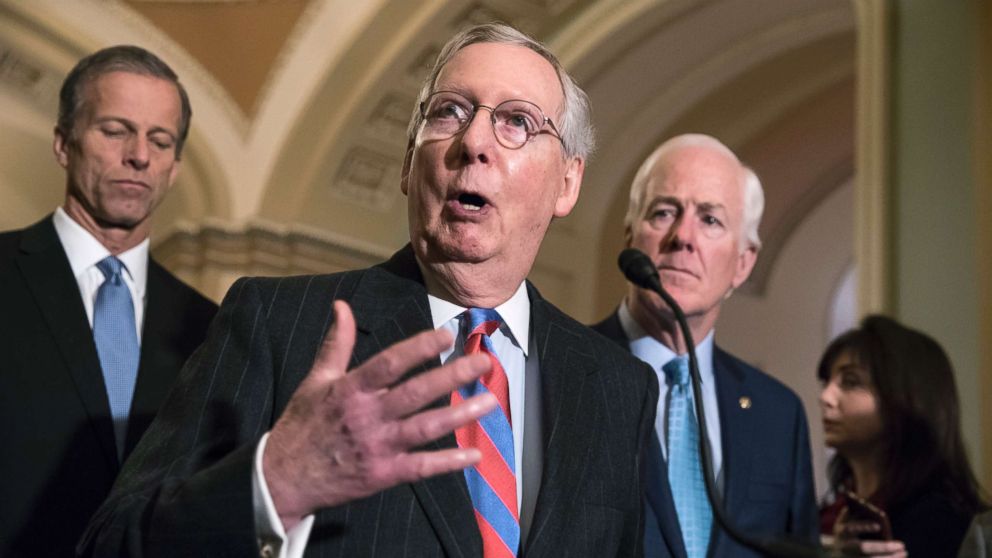Republicans defend tax bill process as transparent despite similar complaints during Obamacare debate
“You complain about process when you’re losing.”

— -- Frustrated by what he believed was an opaque, rushed process to pass a bill with massive economic implications, one lawmaker accused the opposing party of working “behind closed doors without input from anyone in an effort to jam it past not only the Senate but the American people before Christmas.”
This quote could easily have come from a Democrat complaining about Republicans pushing their tax reform bill through Congress, right down to the Christmas deadline. But it’s actually then-Senate Minority Leader Mitch McConnell from December 2009, griping over what he saw as Democrats’ efforts to rush health care reform through Congress after a closed-door process.
It’s customary for the party out of power to accuse its opponents of a lack of transparency when it comes to passing major bills. As McConnell himself put it, responding to Democratic complaints about a tax bill passed Saturday at 2 AM with its text revealed just hours before, “You complain about process when you’re losing.”
But in defending legislation that materialized in the course of eight months and ten public hearings, Republicans are championing a process much less deliberative, by at least one important metric, than the one they criticized Democrats for undertaking in 2009 as they drafted a similarly consequential bill.
Overall, Democrats spent much more time publicly debating health care reform in committee hearings while drafting their bill than Republicans did while writing their tax reform proposal.
During the debate over the Affordable Care Act, three House committees with jurisdiction over the bill held at least six health care hearings over four months – from March to June 2009 – and two Senate committees – Senate Health, Education, Labor and Pensions and Senate Finance – held at least fifteen hearings over eleven months, from January to November 2009.
The HELP committee spent 13 days marking up, or amending and rewriting, the bill. The Finance Committee’s markup was eight days long.
McConnell, who was then the Senate Minority Leader, griped at the time about what he said was the lack of transparency over health care deliberations, and the speed at which they had taken place.
"They are virtually thumbing their nose at the American people who are virtually screaming at us, don't pass this bill," he said, in addition to making his Christmas comment, in December of 2009, just days before the Senate passed its bill, according to the AP.
McConnell was quoted in reaction to news that then-Majority Leader Harry Reid had made a behind-the-scenes Medicaid funding deal with Sen. Ben Nelson (D-NE), which became known as the “Cornhusker Kickback,” to get Nelson’s support. But that deal, and a few others like it, came together only after months of deliberation in congressional committees and a summer in which lawmakers of all ideological stripes got earfuls from constituents about the bill, which helped give momentum to the anti-tax Tea Party movement.
Nelson’s carve-out was not included in the final bill, although another such deal for Sen. Mary Landrieu, which became known as the “Louisiana Purchase,” was.
After both chambers had passed their bills, there was still quite a bit of complicated procedural maneuvering before the final version of the bill was signed into law in March 2010 – including the Senate passing a separate, related bill for procedural reasons -– but only after both parties had been debating the bill’s policy for over a year.
“The debate over the Affordable Care Act was one of the most deliberative, transparent and lengthy in history with one of the Finance Committee’s longest markups on record, second only to the 1986 tax reform bill,” a Senate Democratic Finance aide told ABC.
While simply looking at the number of hearings is an imperfect measurement, said Mark Peterson, the chair of the Public Policy department at UCLA, he noted that while health care affects 1/6 of the economy, certainly no small fraction, tax reform has a more universal impact – and yet much more time was spent in hearings and in public debate for the Affordable Care Act than for the tax bill.
“[Tax reform] is affecting almost every single American in one way or another,” Peterson said.
During this year’s tax debate, House and Senate Republicans held a total of ten hearings on related policy issues over the course of seven months. Both tax-writing committees -- House Ways and Means and Senate Finance -- spent four days each marking up their respective bills.
Spokespeople for the Republican majority on both panels argue, however, that a comparable tally of hearings held on the tax issue should actually start in 2011 because that was the year Republicans gained control of the House and Sen. Orrin Hatch became the top Republican on the Senate Finance Committee.
“Ways and Means Republicans have worked for years to ensure Americans understand how tax reform will directly improve their lives. After over 40 public committee hearings, an extensive four-day markup, and a vigorous House floor debate, House Republicans will soon deliver tax reform that lowers taxes, creates jobs, and grows our economy,” committee spokeswoman Emily Schillinger said in an email.
“Since Hatch became chairman in 2011, the committee has held more than 70 hearings focused on reforming the nation’s broken tax code and has made numerous bipartisan efforts, including drafting option papers and forming working groups, to find consensus on tax reform,” Senate Finance spokeswoman Katie Niederee said.
Aides to Majority Leader McConnell note that it’s common for bill-writers to make changes after the measures pass through committee, which is what happened during both the current tax debate and the health care debate of 2009 and 2010.
They also pointed to McConnell’s evergreen quote – you complain about process when you’re losing – which was just as true in 2009 as it is today.



